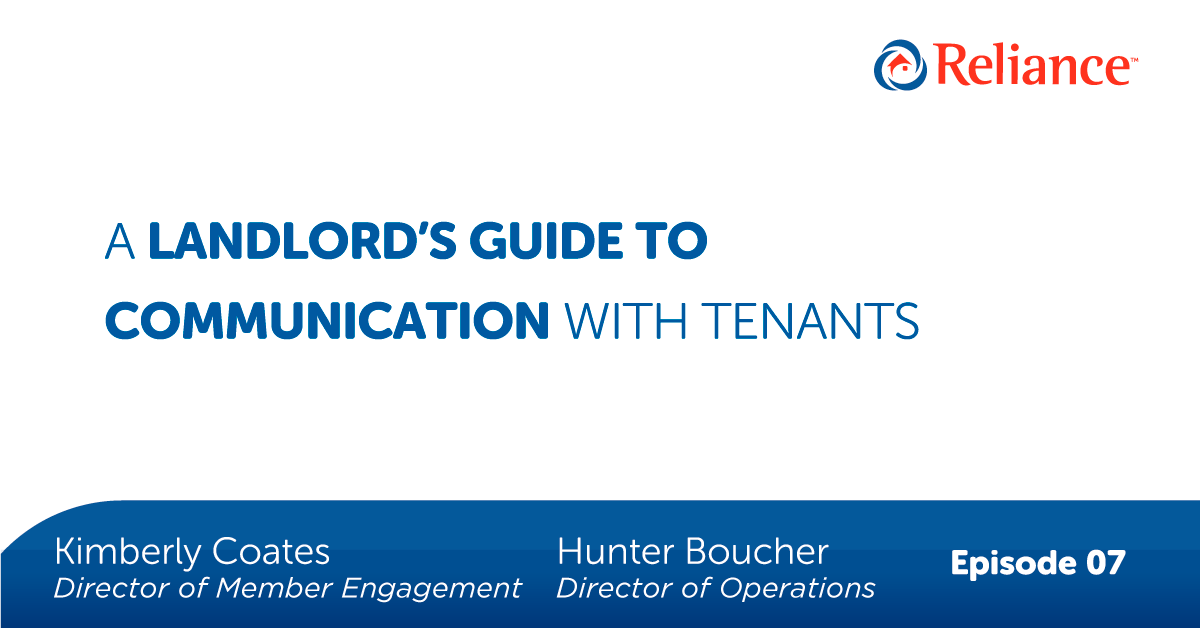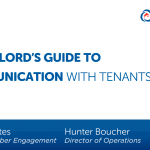Landlords: Here’s How to Communicate Better with Your Tenants6 min read
Reading Time: 5 minutes
A Landlord’s Guide to Communication with Tenants
Landlords: Do you struggle with your tenants?
Maybe rules are broken, conflicts bubble or no one is really sure who is responsible for the yard…
If so, you need to work on your communication.
And on our latest episode, we brought in the experts to help.
From LandlordBC, we have Kimberly Coates, Director of Member Engagement, and Hunter Boucher, Director of Operations.
What we talked about:
- Why communication is important from the first day
- What to communicate upfront
- How to communicate in times of conflict
Every relationship depends on communication
LandlordBC is an industry association that represents owners and managers of rental housing.
They offer tools to support landlords, in all forms, operate their business successfully.
One of the primary resources they provide is through their legislative helpline — for which Hunter is a legislative expert — and help landlords navigate compliance with the Residential Tenancy Act, which governs the entire industry.
And one of the biggest pieces of advice they can give is the importance of communication.
It’s just good business: A great relationship with anybody is founded upon good communication.
At the end of the day, your business is really about the people. Your tenants are your customers and you want the relationship to go as smoothly as possible.
“If you’re a landlord, the tenant is your customer. And you want to be sure that you’re providing them with good service, following the legislation and meeting their housing needs.” — Kimberly Coates
That’s why Kimberly and Hunter both recommend that you practice effective communication from the first day of your relationship.
What to say upfront
Strong communication starts with a thorough application process, including a phone interview.
This helps you look after your property by screening candidates so you’ll know what you’re getting into, but it also means you start off on the right foot when it comes to communication.
Did you read the contract?
You should also discuss the finer points of your rental tenancy agreement so there are no nasty surprises waiting for you down the line.
You need to cover things like who is responsible for the yard work, taking out the garbage to the sidewalk and other maintenance duties.
Otherwise, you risk a misunderstanding that can cause a considerable headache later on.
As an illustration, think about the last time you had to sign a contract for your mobile phone, a social media site or internet service.
Did you read the contract?
Yeah… No one does.
Communicating the rules upfront gives you peace of mind to know that your tenant understands the terms of their tenancy.
“You can have rules all you want. But if you don’t have that communication to back it up, it can really fall on deaf ears.” — Hunter Boucher
What about the guests?
And it’s also helpful to establish this communication for edge-case events that the tenant may not have thought about early on.
An example might be a tenant having a guest over who smokes or brings a pet. The tenant may not be a chainsmoking dog-show-enthusiast, so it never crossed their mind until Uncle Bill decided to pay them a visit.
Establishing clear lines of communication means both parties have an avenue to discuss these issues as they arise.
This doesn’t mean emailing them every day, but it means making sure you get back to them in a reasonable amount of time should an issue arise.
You can reach me by carrier pigeon
It also means establishing the best method of communication, since there is often a generational gap when it comes to communication preferences.
Older generations may wish to communicate face-to-face, while younger ones will only respond to text messages.
Figuring out all of this from the outset may save you both an awkward situation later on.
Communication during conflict
Still, conflict can arise in the course of any relationship, so it’s important to know how to approach it.
And there is one great tool at your disposal (if you’ve read this far, you probably know where we’re going with this)…
Communication.
Again, many conflicts can be avoided by communicating ahead of time.
But as we’ve seen with COVID-19, things can change.
Conflict can arise unexpectedly
You may have a resident who loves her daytime soap operas but is hard of hearing — which never presented a problem until her neighbor had to work from home.
The first option you have is to just do nothing. Maybe the neighbor is stressed out with the changes and cools off in a couple of days.
If not, you could try an informal approach. A quick phone call may just solve the problem before it festers into anything serious.
Of course, we aren’t always so lucky. For more serious conflicts, you may need to issue a warning.
It could just be a more stern conversation, but if that doesn’t seem to work or you anticipate further problems later, you may need a more forceful approach.
Communication and the law
This is where you start getting into legal remedies. The Provincial Residential Tenancy Act means that, if you want to be taken seriously in later proceedings, you need to have documented a formal, written warning.
In it, you should describe what the issue is, how to resolve it and what the consequences for failing to take action will be.
And really, the only option you have, should this caution notice goes unheeded, is to end the tenancy. That’s why Kimberly and Hunter recommend reserving such a warning for only the most extreme circumstances.
“We recommend people only use that caution notice when they’re ready to end that tenancy.” — Hunter Boucher
Ultimately, it is up to you to determine the level of seriousness in any given situation and determine whether you should be communicating a friendly reminder, a stern warning or even just letting the situation play itself out.
But remember: While interrogating the situation, it’s important to document it just in case you’re left with no option other than legal remedies.
Keep communicating
The world has turned upside down in an incredibly short period of time.
And whether the pandemic is causing conflict or not, it’s important to reach out to your tenants in this uncertain time.
They may need your help, but were afraid to ask. You may be able to spot conflicts brewing before they bubble to the surface.
But most of all, it’s the right thing to do.
In an era of social distancing and isolation, you never know how important a simple conversation might be for someone.
So, keep communicating.
This post is based on a Business Optimization podcast with Kimberly Coates & Hunter Boucher. The views, information, or opinions expressed during the podcast series are solely those of the individuals involved and do not necessarily represent those of Reliance Home Comfort and its team members.
To hear this episode, and many more like it, you can subscribe to Business Optimization here. If you don’t use Apple, you can find us here.



